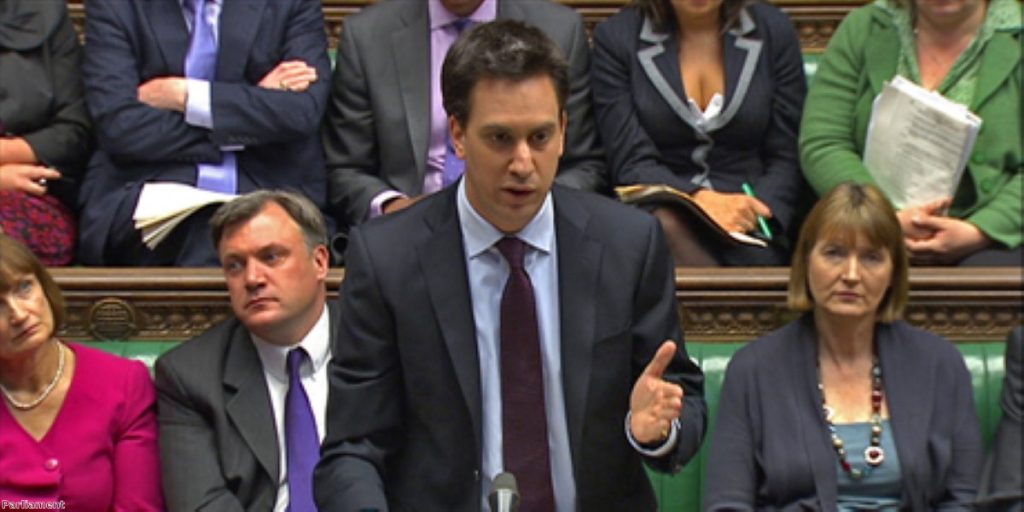Sketch: Miliband strikes in PMQs
We now know what it takes for Ed Miliband to put in a good performance at PMQs. When Britain is enduring the biggest strike in a generation, he finally ups his game.
By Alex Stevenson Follow @alex__stevenson
That wasn't immediately obvious in this week's tense, exciting prime minister's questions. This is a day when politics is affecting the lives of most people in the country: 30 trade unions have united together to challenge ministers' plans to hike the cost of public sector pensions. Surely this was an opportunity for Miliband, who earlier said he has "great sympathy" with the strikers, to come up with the goods at the despatch box?
After a very neat first question in which he quoted a striking schoolteacher whom Cameron had praised for not walking out earlier this year, the prime minister started extremely well. Why were they striking? Miliband had asked. Cameron, speaking slowly and clearly like an Englishman speaking English abroad, explained: "They object to the reforms we are making to public sector pensions." A straight answer: unorthodox, perhaps, but very neatly done.


He then quoted John Hutton, Labour's former work and pensions secretary, as an even more effective way of muting opposition moaning, before quoting Miliband back this summer saying that strikes then were wrong. Cameron, forgetting he was the one supposed to be providing the answers, finished with a question: why had Miliband changed his mind?
"Answer!" the Tories yelled, earning a rebuke from the Speaker for their "orchestrated barracking". Of course Miliband did not. Instead he took on Cameron's claim that the strike was taking place "at a time when negotiations are still underway".
This very straightforward issue is exactly the subject of intense debate between ministers and unions. Indeed, if they spent all the time wasted on debating whether talks are currently ongoing engaged in genuine dialogue instead, we might be a lot closer to an end to the impasse.
"They declared negotiations at an end four weeks ago!" Miliband declared. Cameron responded by insisting this was "completely untrue! – there had been talks yesterday, and there would be tomorrow, he said. More big cheers from the Conservative backbenches. The sheer momentum of their vocal support only amplified Miliband's difficulties.
He then made things much worse for himself with a verbal slip about poor old cleaners – "people who earn in a week what the chancellor pays for his annual skiing holiday". First came the reflex cheer from Labour MPs. And then, as the government benches realised what he'd said made no sense, a slowburning, contemptuous laughter slowly bubbled up. Miliband stuttered, repeating himself, his momentum entirely deflated. It was lucky John Bercow intervened yet again, giving him the time he needed to regroup.
At this low point it appeared Miliband had once again managed to make a complete hash of the session. Things looked black for Labour. "I'm not going to demonise the dinner lady, the cleaner," Miliband said desperately. Cameron was contemptuous. "Let me remind him about the facts," he said patronisingly. Miliband wrinkled his nose and put his palms outwards, with all the futility of a desperate footballer's appeal.
Things were so bad that shadow chancellor Ed Balls felt Miliband could do with a bit of advice. He began rabbiting away at his leader, muttering advice as Cameron droned on. Miliband, stuck between Cameron in full-flow towering over him and Balls jabbering to his right, appeared thoroughly distracted. Eventually he nodded irritably, moving forward dismissively in his seat as Cameron's press office-approved lines were rolled out.
The prime minister even felt complacent enough to make a jibe at Labour for being "in the pocket of the unions". That got roars of approval.
But then came the change. Miliband leapt up from his seat, grateful to get away from Balls. He was proud of receiving money from the unions, he insisted; this was "better than those millions from Lord Ashcroft!"
At last! He was starting to rally. The Labour leader then launched into a broader attack on low-paid workers. "He sits there shaking his head," he hissed at Cameron, who, head down, was furiously leafing through his notes. "He doesn't understand his own policy!"
For the final third of the exchanges it was all Miliband. He leapt up from his seat again to point out that child poverty was going up as a result of yesterday's autumn statement. He poured scorn on Michael Gove, telling the education secretary to "calm down!". He came up with one of his better soundbites: that Cameron was "another Conservative prime minister for whom unemployment is a price worth paying".
The PM tried to come back by calling Miliband "weak" and "irresponsible". But his only answer to Miliband's criticisms was to say Labour would borrow even more. It didn't quite cut the mustard. "His plan has failed," the Labour leader seethed. "He is making working families pay the most. He will never again be able to say 'we're all in this together'!"
Labour MPs cheered, competing with the Tories for the first time in what felt like weeks. Miliband, full of beans, sat down, and did something he's never done before: grin happily as he listened to Cameron's answer. The adrenaline of the moment, that spark which so often has been missing, had carried him through what at one stage had looked extremely difficult.
Cameron finished with his usual flourishes, as well as an appalling joke about the Unison union which Tory MPs seemed to laugh at before the punchline had been delivered.
"We are being tested in this difficult times, but we will meet that test," Cameron pledged. At last, it looked like Miliband was finally meeting the challenge he faces, too.









